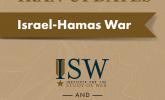Positional Warfare in Alexander Svechin’s Strategy
March 29, 2024 - ISW Press
Discussions of the character of the Russian war in Ukraine have increasingly adopted terms such as “stalemate” and “attritional” to describe the state of the conflict. Both terms draw parallels with the Western Front of the First World War that are not wholly inaccurate but that can be misleading if taken too far. The current Russian war in Ukraine is certainly not stalemated in the sense of having reached a point where neither side can make further progress. Nor is it, properly speaking, attritional. An attritional war is one in which attrition itself is the victory mechanism — that is, one side aims to win by wearing the other down through losses.










